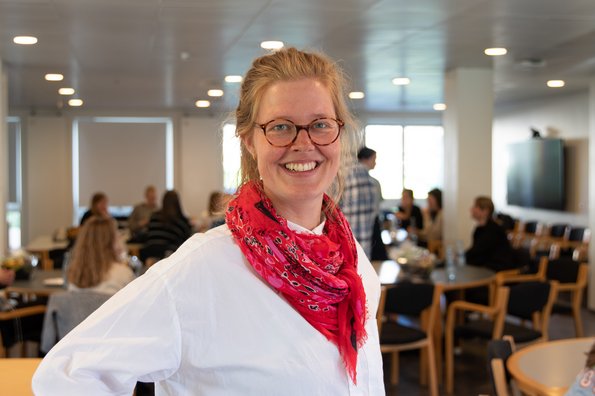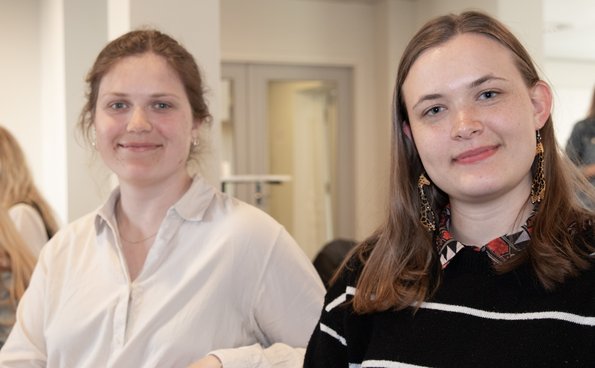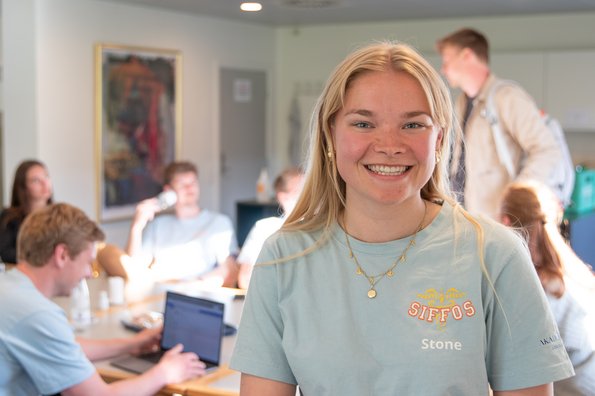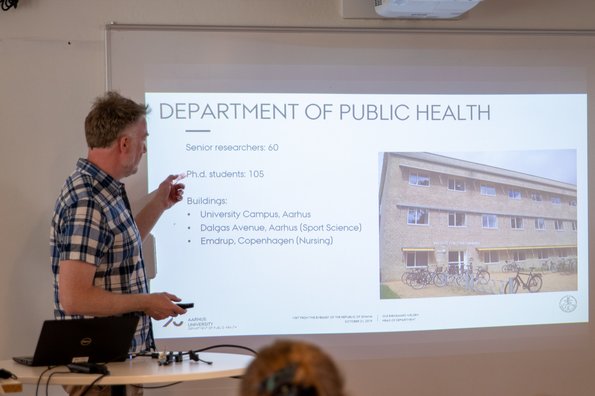Students: What on earth is a PhD?
What does an assistant professor do? What is a PhD? – And how do you get your own? These were some of the questions asked by students from the Department of Public Health last week, when they met with representatives of the department's teaching staff and management to talk about career opportunities, among other things.
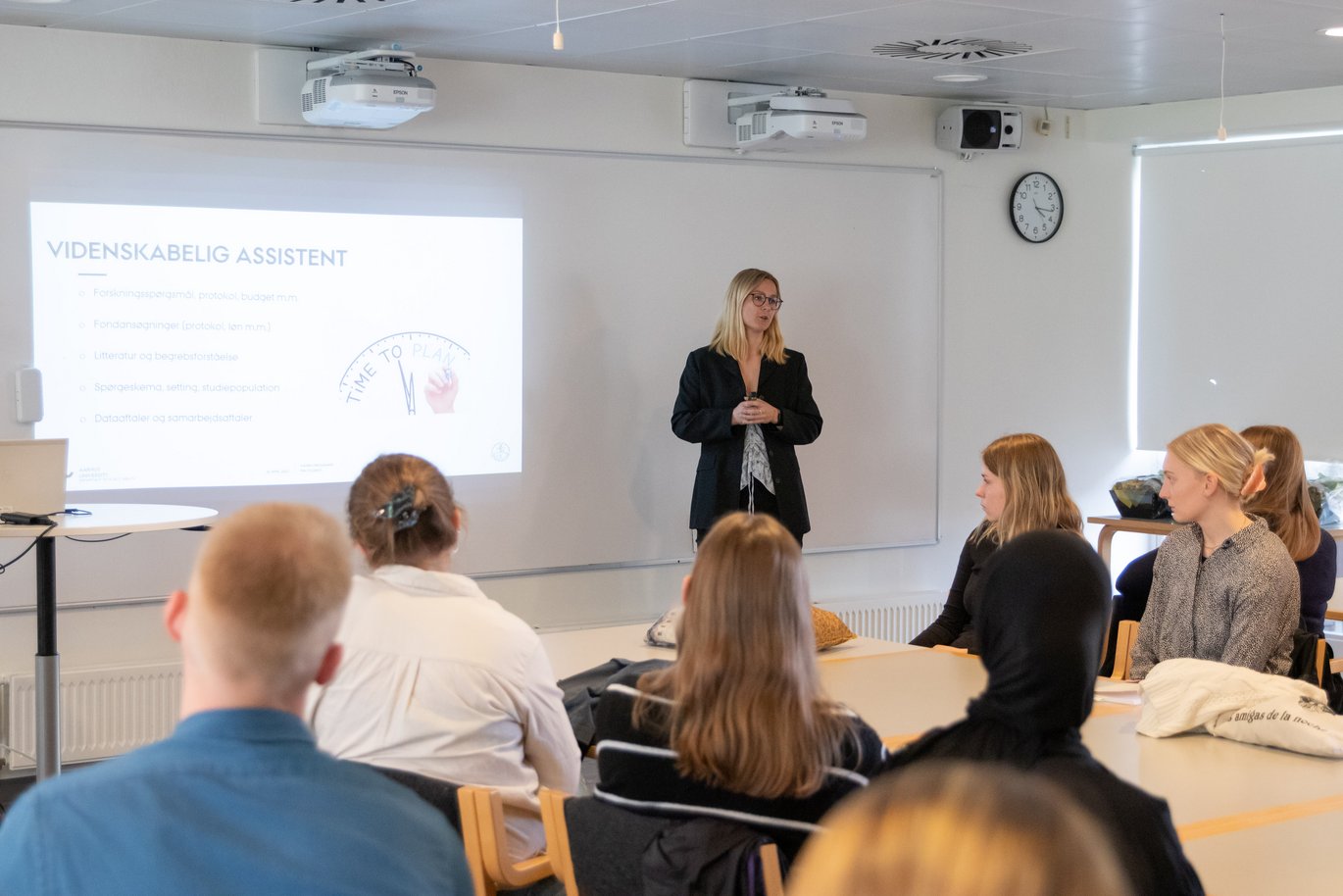
FACTS
Five of the best tips from the meeting for students considering a PhD:
- Network – nurture and expand what you already have.
- Be curious and remember that you are a student – academia is a monster that will eat you up if you forget to take time off.
- Get started in good time and be proactive.
- Let your curiosity guide you.
- Be prepared to write a lot of funding applications.
The speakers were:
Head of Department:
Ole Bækgaard Nielsen
PhD-students:
Christian Antoniussen
Caroline Arnbjerg
Maiken Melgaard
Nanna Husted
Assistant Professor:
Tina Wang Vedelø
The meeting was organised by the department’s student association SIFFOS in collaboration with the department management team, and it originated from a mix of curiosity and interest, explains Stine Arp, who is a Bachelor’s student at public health science and responsible for the academic content in SIFFOS.
The students wanted to meet the PhD students
"The idea behind the meeting came from us in the association. A PhD degree can seem somewhat lofty, a little aloof, and a concept which our teaching staff sling out indiscriminately. We will soon be starting on the Master's degree programme, so any PhD degree isn’t that distant anymore. That's why we wanted to find out more about it," says Stine Arp.
The SIFFOS student association therefore contacted the department, who immediately saw the perspective in it and worked with the association to hold an event for the students. According to Department Head Ole Bækgaard, there are several good reasons why they acted without hesitation.
"First of all, it's fantastic that it's a collaboration which the students are behind. It’s a good and very welcome initiative. At the same time, we also got some valuable insight into the students' understanding of the university as a workplace and educational institution. Which gave us a lot of learning. It was the best kind of two-way experience- and knowledge exchange, and I'm really pleased with the event. I hope we can hold similar events ad hoc and also expand the idea to the other degree programmes," he says.
From abstract concept to real career opportunity
No hands were raised when PhD student Christian Antoniussen began the presentations by asking whether any of the students present already knew that they would go after a PhD. However, according to Asra Sverre Hasselager, who is studying public health science, the lack of raised hands was mainly due to the fact that the concept was somewhat diffuse when the meeting started.
"After the meeting, a PhD suddenly became a real possibility. Before it was a bit abstract. Hearing the different presentations has boosted my academic understanding. In fact, I can move on from where I am now. Which gets me thinking about what I can and will do when I finish my Master’s degree programme," says Asra Sverre Hasselager.
Fellow student Katrine Brandt Alsner backs her up:
"I realised that I didn't really know what a PhD was. For example, I didn’t know that a PhD degree includes a study abroad period, and that there are so many different paths into a PhD degree. It's not at all pre-determined as I had thought," she says.
All roads lead to Rome – and perhaps also to a PhD degree
The many different paths from the Master's degree programme and on to a PhD degree can surprise even the most experienced of us, as Department Head Ole Bækgaard observed after the meeting.
"Initially, I was a bit surprised to hear that it was difficult for the students to really understand what a PhD student is. But now that I’ve heard the four presentations today, I can see that it can be a little difficult to find out which path you should follow if you want to do a PhD," he explains.
The students were also presented with four completely different entry points to a PhD degree programme. From a clear plan to end up on a PhD degree programme already at the start of the Bachelor’s degree programme, to a suggestion by a teacher/supervisor. For PhD student Caroline Arnbjerg, a study trip to Rwanda was what kick-started her PhD degree programme. She hopes that the students were motivated and inspired by the meeting.
"The most important thing for me was to tell the students about what you can use the research for. About the importance of communicating evidence and looking critically at data and reality. So I hope that they feel inspired and empowered, and ready to take a chance and run some risks. And I hope that we've been able to demystify what a PhD actually is," she says.
Our doors are open – if you dare to knock
At the meeting, one word was repeated again and again: Network, network, network. All four PhD students stressed that this was a crucial factor – not just for getting started, but also for enjoying a successful PhD degree programme. And when a student asked how they could build a network, the speakers came with the same answer:
"Knock on our door! All of us are ready for a discussion, and you don't need to have a polished pitch ready. It's completely fine to turn up with a loose idea, a simple question, or just to hear more about the projects."
The final presentation by Assistant Professor Tina Wang Vedelø about her path to firstly a PhD and then to a position as assistant professor had the same message: “You MUST have the courage to knock people’s on doors. The worst thing that can happen is you’ll get a no, and that really isn’t so dangerous," she said.
